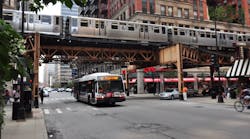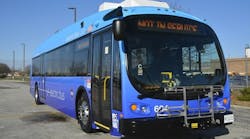CTA’s 2023 budget proposal: No fare hikes, continue capital work
The Chicago Transit Authority’s (CTA) proposed $1.8 billion operating budget keeps fares at current levels, maintains the agency’s commitment to improving service and continues important investments to upgrade and modernize the system.
The proposed spending advances the CTA’s “Meeting the Moment: Transforming CTA’s Post-Pandemic Future” Action Plan, a multifaceted investment plan that focuses on responding to customers’ concerns and strengthening the foundations of the rider experience – more consistent and reliable service, safe rides, clean facilities, modern amenities, dynamic customer engagement tools, and a strong CTA workforce.
“Our proposed 2023 operating budget is both fiscally prudent and responsible, with a focus on further improving the essential transit services that Chicagoans rely on as the region continues to evolve from the pandemic,” said CTA President Dorval R. Carter, Jr. “In the year ahead, we are committed to maximizing every dollar of our budget to both modernize our system and continue work on the strategic initiatives outlined in support of the guiding pillars of ‘Meeting the Moment’ Action Plan, which addresses the most pressing challenges facing our customers and employees.”
CTA ridership grew steadily throughout 2022, reaching a pandemic-era high of more than 5.5 million weekly rides the first week of October. Ridership is projected to increase further in 2023, approximately nine percent over 2022 ridership.
To ensure that CTA meets that demand, the agency continues an aggressive, comprehensive recruitment program to address the biggest issue impacting service: attracting and retaining workers, especially frontline employees like bus and rail operators. Like businesses across the country, especially those in the transportation industry, the CTA continues to face workforce challenges related to the pandemic. The impacts of the Great Resignation, retirements, competition for workers and other factors means that the CTA does not have enough Bus and Rail operators needed to provide all scheduled service.
In 2022, the CTA made great progress toward addressing this issue, hosting eight job fairs that attracted hundreds of potential employees, while hiring dozens of new workers into a variety of positions. The agency has also worked closely with its operator’s union to help address a shortage of nearly 1,000 workers.
Additionally, the CTA continues to improve the digital tools used to provide customer information. Already, CTA introduced a redesigned, mobile-friendly Bus Tracker website, and continues to work on the data and algorithms that power the trackers, to make sure they are as accurate as possible.
Since the start of the pandemic, federal funding has been crucial to allow transit agencies across the country, including the CTA, to maintain their operations. Federal funding from the American Rescue Plan will help the CTA close a projected $390 million budget gap in 2023—and allow the agency to continue providing full service. Despite the financial challenges, the CTA continues to look for ways to operate more efficiently and effectively, and to best serve the region.
Additionally, the CTA remains focused on modernization and improvement of its physical infrastructure—tracks, rail stations, buses and trains, facilities and technologies. The CTA’s 2023-2027 Capital Improvement Program—which is separate from the agency’s operating budget—calls for $3.4 billion in projects over the next five years. Among many important investments is the Red Line Extension, which will extend the CTA’s busiest rail line to the southern City limits and will provide greatly improved transit access and connectivity to the Far South Side of Chicago.
Other capital projects to continue or begin in 2023 include:
- All Stations Accessibility Program (ASAP), to make CTA’s rail system 100 percent vertically accessible.
- Expansion of electric bus fleet, part of CTA’s commitment to complete the electrification of the entire bus fleet by the year 2040.
- Refresh & Renew, an expanded and accelerated rail station improvement program.
- Better Streets for Buses, a comprehensive, citywide plan for bus-priority streets.
“Investment in transit infrastructure has always been an investment in a strong future for the city,” Carter said. “Further, continued investment in transit is directly tied to our city’s economic recovery, a way to promote jobs and opportunities at a time when the city needs them most.”




